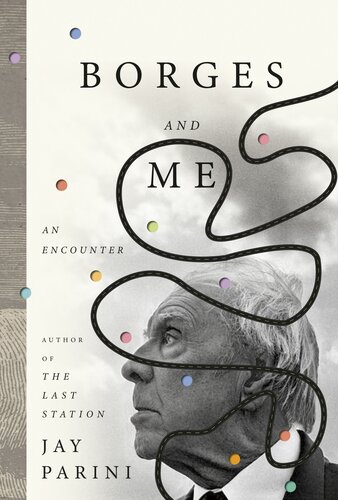
Borges and Me
An Encounter
کتاب های مرتبط
- اطلاعات
- نقد و بررسی
- دیدگاه کاربران
نقد و بررسی

Starred review from March 23, 2020
In this astute memoir, novelist Parini (The Last Station) writes of leaving Pennsylvania in 1971 to pursue a PhD in literature at St. Andrews in Scotland. There, he describes himself as the “last 22-year-old virgin in the Age of Aquarius” as he finds his voice as a writer and escapes the draft. He soon falls for antiwar activist Bella Law, who has a boyfriend and is indifferent to Parini’s meek advances. Then, after Parini’s writing mentor, poet Alastair Reid, asks him to host his houseguest, Argentinian author Jorge Luis Borges, a one-week ramble through the Scottish Highlands ensues. His mission: to describe the entire trip for the blind writer (“He knew what he wanted to see. Or to have me describe”). Parini also plans to meet his thesis subject, poet George Mackay Brown, on the isle of Orkney, but on the way realizes that Borges, a “batty old man of letters,” is a literary jukebox, referring to such literary works as Beowulf (while capsizing their rowboat on Loch Ness) and writers including Victorian poet Gerard Manley Hopkins. Over the days, a tender bond forms between the eccentric sage and his caretaker. En route to meeting Brown, Parini loses his virginity to a free-spirited innkeeper’s daughter, and, newly emboldened, Parini returns to St. Andrews and kindles a relationship with Bella as he matures as an author, writing, “I could sense my own voice emerging.” Fans of both Borges and Parini will delight in this touching coming-of-age memoir.

May 15, 2020
The renowned biographer, novelist, and poet recounts his transformative youthful journey with a famed literary master. In 1971, when he was a graduate student at St. Andrews University in Scotland, Parini took two short journeys--here combined into one weeklong trip in order to maintain "narrative efficiency"--in the company of Jorge Luis Borges (1899-1986), who was visiting one of Parini's mentors. At the time, Parini had not read anything Borges had written, and he was surprised that his friends not only knew of the Argentine writer, but held him in the highest esteem. At first, Parini saw Borges only as a garrulous, "difficult and self-involved" old man, given to nostalgic memories of a lost love and disquisitions on an astonishing range of literature. He needed constant attention due to his blindness and constant acquiescence to his impetuous needs. Still, Parini agreed to squire Borges around the Scottish Highlands, serving as his guide, aide, and, especially, his eyes. Parini delivers vibrant descriptions of clouds and rain, earth and sun: "the bright lakes, the fertile land with stone barns and hillsides smudged with white-and-gray sheep," the oaks with crooked limbs, and the dark waters of Loch Ness, in which their rowboat capsized. Parini decided that one should never take a "childlike, irascible, and unpredictable" old blind man in a rowboat. But by the end of their travels together, Parini realized that Borges was extraordinary: a man who glowed with "an enigmatic brilliance. One felt somehow more intelligent, more learned and witty, in his presence. The universe itself felt more pliable and yielding, and so available." Parini's vividly detailed memoir, replete with verbatim conversations, is the result of much shaping and retelling, first in fragments over the years, later as a novel, and then as "a kind of novelistic memoir," which, Parini writes, "survives in its transformation into this text." A captivating chronicle and homage.
COPYRIGHT(2020) Kirkus Reviews, ALL RIGHTS RESERVED.

June 1, 2020
Parini?biographer, novelist, poet?delivers his most unusual work, a fictionalized memoir (he explains his inventions) recalling his beginnings as a writer. Fifty years ago, Parini became a doctoral student at St. Andrews in Scotland, where he'd spent an undergraduate year. Aside from immersion in British poetry, he mainly wanted to avoid the U.S. draft if not also his overbearing mother. Good friends were serving in Vietnam, but Parini had no interest in or aptitude for becoming a mud-caked soldier. A mentor invited Parini to tend to a distinguished visitor, the Argentinian fabulist Jorge Luis Borges, whose story, Borges and I, about the divide between the self and the persona of writer, inspired this book's title. Parini's week with the crusty Borges included a rollicking, endearing road trip through the Scottish Highlands. Parini haltingly describes the landscape for his blind passenger, who taps his memory for a bounty of literary wisdom. Along with losing his innocence to a frisky innkeeper, Parini absorbed indelible lessons. Not least, Borges' advice on the task of writing, To find a language adequate to what is revealed. (Reprinted with permission of Booklist, copyright 2020, American Library Association.)

July 17, 2020
Novelist, poet, and biographer Parini (English, creative writing, Middlebury Coll.; Damascus Road; Why Poetry Matters) here relates his time in Scotland as a literature student in the 1970s at the University of St. Andrews, where he first met the Argentinian author and poet Jorge Luis Borges (1899-1986). Alastair Reid, Parini's mentor and a fellow poet, introduced the pair, and using this initial encounter as a starting point, Parini weaves a brilliant narrative touching on Borges's singular writing style, the effects of aging on the author (Borges was around 70 and blind when Parini met him), and the workings of a perpetually active mind as seen through the lens of Borges's literary reality. The resulting portraiture of the two men--Borges and Parini, whom Borges always addressed as "Giuseppe"--further boasts passages of somewhat oddly placed profanity and allusions to the lives of other writers and poets such as Walt Whitman. Parini's cook even makes an appearance, comfortably fitting into a narrative reflecting Borges's ficto-historical sensibility. VERDICT Essential for Borges's legions of fans, as well as those who enjoy literary memoirs by experimental writers whose works play a bit more loosely with the facts.--Jesse A. Lambertson, Univ. of Chicago Law Libs.
Copyright 2020 Library Journal, LLC Used with permission.

























دیدگاه کاربران